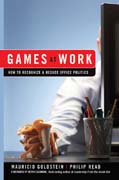
Games at work: how to recognize and reduce office politics
Goldstein, Mauricio
Read, Philip
This books gives managers the tools to ‘diagnose’ the games that people play in an organization, and then to free people's energy for more productive purposes, thus minimizing the damage to both the bottom line and the company dynamics. Some typical games include: Gotcha where people act as if they receive points for identifying and communicating others mistakes. Gossip the rumor mill is used to gain political advantage. Low Budget where managers purposely low-ball budget requests as a negotiating ploy. Marginalizeeffectively exile individuals from teams or groups because they challenge the status quo, arent one of the boss people or for other reasons. Blame individuals seek scapegoats in order to excuse failure. Gray Zone de liberately fostering ambiguity or a lack ofclarity about who should do what to avoid accountability Pecking Order peopleplay favorites and put others in the doghouse as an exercise of power Pessimism people artificially inflate the difficulty of an assignment in order to create lower expectations Big Idea suggesting visionary strategies and concepts to communicate ones creativity and vision without regard for the implementability of these ideas. No Bad News avoiding or suppressing negative data in relentless pursuit of a positive approach. Using a three step process entitled AIM (Awareness, Identification, Mitigation) with specific examples from global companies that illustrate both the games and their solutions, the authors provide a clear outline for managers to address and end the games people play in organizations.
- ISBN: 978-0-470-26200-9
- Editorial: John Wiley & Sons
- Encuadernacion: Cartoné
- Páginas: 256
- Fecha Publicación: 29/04/2009
- Nº Volúmenes: 1
- Idioma: Inglés
